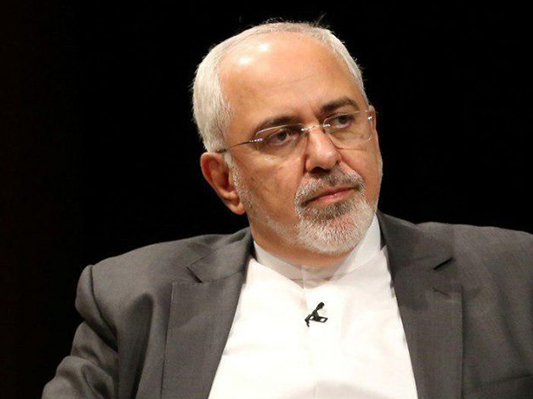Speaking at a conference in Tehran on Saturday, Zarif referred to the countries which depend on super powers for their security.
“There are countries around Iran whose security depends on transregional countries, and which feel shivers down their spines once supers powers become furious, but feel secure and euphoric once they (major powers) smile,” he said, according to a Farsi report by Fars News Agency.
“After the JCPOA was signed, [Leaders of] some countries hurriedly went to Camp David and said ‘Why did you leave us alone? We don’t have any security and independence without you.’ And When Trump travelled to the region and had sword dance with rulers of those countries, they became ecstatic and felt they had been given new security,” Zarif said.
Trading Independence for Security
He said there are countries which trade their independence, dignity and reputation for security and allow foreign weapons companies to loot their rich resources in order to provide security for them.
“Persian Gulf countries spent $116 billion on arms last year,” the top diplomat noted.
He said Saudi Arabia overtook Russia, a nuclear superpower, in terms of arms spending last year.
“Saudi Arabia now ranks third in the world when it comes to arms spending,” said the foreign minister.
“None of these countries feels they have security, and the world does not regard any of those countries as secure and powerful,” he said.
Neighbouring Countries Not Ready for Talks
He said Iran holds negotiations with a country that “respects us.” He said Tehran has no problem sitting at the negotiating table with neighbouring countries, and added, “They are the ones who are not ready.”
The Iranian foreign minister further underlined weapons and defence preparedness are important for Iran, so that criminals such as former Iraqi strongman Saddam Hussein would not be able to launch missile attacks on Iranian cities and “we will be able to defend our citizens.”
Iran’s Missile Program Non-Negotiable
The top diplomat reiterated that Iran will not sit down for talks on its missile activities.
“Definitely, Iran’s missile program is both important and non-negotiable,” the foreign minister said as quoted by the Persian-language Fars News Agency.
He then lashed out at the double standards adopted toward Iran’s nuclear and missile programs.
Zarif said Iran is criticized for its missile program while its neighbours possess ultra-modern warplanes and weapons, including missiles. He said Saudi Arabia is in possession of nuclear-capable and intercontinental ballistic missiles with ranges up to 2,500 kilometres.
“The military spending of Iran, with such an expanse and a population of 80 million, is between 12 to 16 billion dollars. Saudi Arabia, with this population and US support, has paid $67 billion to buy arms,” Zarif said.
Iran Always at Negotiating Table
The foreign minister said the other parties to the talks on Tehran’s nuclear program were trying to create the impression that it was they that brought Iran to the negotiating table.
“But Iran was always at the negotiating table and never left it,” Zarif noted.
He said the West saw that their crippling sanctions had further united Iranian people and officials rather than divide them.
“They arrived at the conclusion that sanctions are a nonstarter and cannot bring these people (Iranians) to their knees,” he said.
